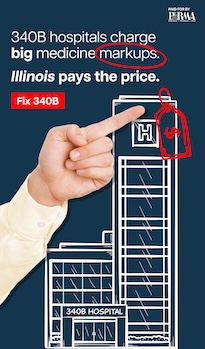It ain’t going to be easy
Friday, Mar 23, 2012 - Posted by Rich Miller
* The Senate met in a Committee of the Whole yesterday to begin the process of understanding the complicated and partially intractable problem of Medicaid spending…
Illinois may be trying to cut more from its Medicaid program in a shorter period of time than any other state, Illinois senators were told Thursday.
Joy Johnson Wilson, health policy director for the National Conference of State Legislatures, said other states have made significant cuts in their Medicaid programs, but have done it over two years rather than one.
Gov. Pat Quinn said in his budget proposal that he wants to reduce Medicaid spending by $2.7 billion next year. A working group of state lawmakers is meeting to find ways to make the cuts. Options include beefing up determination of eligibility so that people who don’t qualify are removed, eliminating or paring back services that aren’t required by federal regulations and reducing rates paid to doctors and hospitals that treat Medicaid patients.
* One of the dilemmas states face…
(T)here are some optional services, such as dental care, that states can cut. Wilson warned that even cutting those services can be tricky. Arizona, for instance, cut dental care but then found more people ended up going to the hospital for dental problems.
* More problems…
Wilson cautioned that some of the money-saving solutions carry their own problems. While Illinois and other states want to move Medicaid recipients into managed-care programs, such programs can be difficult to establish in rural areas that may be medically underserved.
Reducing reimbursement rates can drive medical providers out of the system, she said.
Discuss.














- Old Milwaukee - Friday, Mar 23, 12 @ 9:57 am:
This is what happens when you don’t address problems in a timely manner. Now it’s almost unsolvable. Brilliant.
- Sunshine - Friday, Mar 23, 12 @ 9:59 am:
I wouldn’t wish a tooth ache on anybody!
Wouldn’t we realize a huge savings if we could reduce fraud and abuse, as that is one of the favorite areas of blame?
Perhaps funding for enforcement might be a better way. Put it into the private sector’s hands, through bid, and pay fees based upon provable reductions.
- Sideliner - Friday, Mar 23, 12 @ 10:11 am:
Will reducing rates paid to doctors and hospitals that treat Medicaid patients help solve, or exacerbate, the problem?
- Yellow Dog Democrat - Friday, Mar 23, 12 @ 10:25 am:
This is part of the reason Illinois needs to move from an annual to a biannual budget.
My prediction:
Politics won’t allow the General Assembly to punt this issue over two years. Nor can they cut $1.3 billion somewhere else.
So, what they will do is pass $2.7 billion in cuts that are such a flagrant violation of federal law that they will be overturned. But not until after Election Day.
BTW, look for the same approach on pensions: an unconstitutional bill that gives the Republicans and the Chicago Tribune everything they want. But will be overturned.
I can’t imagine the courts are going to allow the state to raise the retirement age for a 64 year-old who has been paying into the pension system for 30+ years.
- JN - Friday, Mar 23, 12 @ 10:32 am:
The fraud nonsense is really getting old.
These pols really just need to figure out which demographic they hate the most and get on with it.
- Boone's is Back - Friday, Mar 23, 12 @ 10:38 am:
The dental care cut is an example of cutting off your nose to spite your face. I’ve spoken with dentists from the Chicago Dental Society regarding massive cuts to the program, and people end up undergoing $15,000 surgeries at the ER when the could have gotten the tooth extracted by a dentist for $75. Either way that is a cost to taxpayers. Basic preventive dental care is a cost effective program worth keeping, and its sad to see that Congress, and many states, will most likely slash it in their Medicaid cuts.
- zatoichi - Friday, Mar 23, 12 @ 10:59 am:
Good luck finding more providers willing to take more people at reduced rates. Locally, try finding any dentist if you are Medicaid. Physicians are not far behind. Also depends on which Medicaid you are talking about. The straight medical is easy: physicians, dentists, hospitals. The other part of Medicaid is the community based social service provider: mental health, drug alcohol, aging, day programs, residential. Managed care can work great for broken arms and episodic medical services where tissue heals at a expected rate. Does not work so well for autism, chronic schizophrenia, and intellectual disabilities, and degenerative diseases that do not ‘heal’ after 6 treatment sessions.
- Michelle Flaherty - Friday, Mar 23, 12 @ 11:17 am:
Boone’s is Back,
And so what exactly is your proposed solution?
Are you calling for a tax increase for Medicaid? Any cut will trigger a parade of horribles. But something’s gotta give else the whole thing collapses.
- langhorne - Friday, Mar 23, 12 @ 11:17 am:
the iefc (now cogfa) did a lengthy study of medicaid costs and controls. they identified various problems and strategies having to do with hospital utilization, nursing homes, eligibility, docs, etc. lots of interesting lessons in their recommendations. for ex., the gov attempted to limit doc fees, so the docs changed their billing code usage to generate lost revenue. oh yeah, the study was in 1973 or 1974. all the same problems, just fewer zeros.
- Pillory - Friday, Mar 23, 12 @ 11:30 am:
“These pols really just need to figure out which demographic they hate the most and get on with it. ”
Profound.
- soccermom - Friday, Mar 23, 12 @ 11:45 am:
It’s not just about toothaches. Dental health has a huge effect on overall health, and missing teeth make it almost impossible to find a job. Without front teeth, you can’t speak understandably. And what employer is going to hire a toothless receptionist or clerk? Penny wise, pound foolish.
- Yellow Dog Democrat - Friday, Mar 23, 12 @ 12:47 pm:
@JN, Pillory -
Like the Titanic, the lifeboats will be reserved for first-class passengers.
I don’t expect any reduction in pharmaceutical reimbursement rates.
- Cook County Commoner - Friday, Mar 23, 12 @ 12:52 pm:
Our fine state senators should talk to the fine executives from the health insurance companies that have been donating campaign cash for a lecture on insurance pooling and avoiding adverse risk selection when issuing coverage. Then all would be clear.
The best way to mitigate risk (and maintaining profits) in issuing insurance for a particular casualty (bad health) is to get the greatest number of participants in the same pool. But fragmentation of the health market often makes it difficult to achieve a stastically viable pool size.
The next best way to manage costs (ergo profits) is to avoid adverse selection, ie, insuring too many sick people. Declining on a pre-existing conditions works great for individual policies, but group plans require the insurer to take all comers. But in large employer based group coverages, the human resourse dept unofficially vets prospective employees for suitability to do the work, which, if handled correctly inures to the benefit of the health insurer by essentially excluding many unfit individuals. Thus, the popularity of large group health plans as money makers for insurers.
But what about all those sick people who can’t get individual coverage or who can’t get hired into a group plan? For many, it’s destitution, suffering and worse. The emergency room provides some relief, but we all get to pay for that.
Solution: Eliminate all group plans (private and public sector) and eliminate insurance declination based on pre-existing conditions. And force eveyone into the largest pool possible. Indigent members would be subsidized by the rest.
Sorry folks. Some sort of unfragmented, mandatory nationwide or statwide pooling appears to be the only answer, statstically speaking.
- 47th Ward - Friday, Mar 23, 12 @ 1:27 pm:
===Some sort of unfragmented, mandatory nationwide or statwide pooling appears to be the only answer, statstically speaking.===
Sounds like Obamacare. I hope the Supreme Court agrees with you as much as I do.
- PublicServant - Friday, Mar 23, 12 @ 1:55 pm:
CCC - Thanks for that clear, concise reasoning.
- Boone's is Back - Friday, Mar 23, 12 @ 1:58 pm:
Michelle Flaherty-
I’m not proposing anything. I’m simply saying it will cost the medicaid system more in the long run for emergency procedures that are exponentially more costly than covering basic, cheap procedures like tooth extractions. (See my example above of a $75 vs. $15,000 for massive infections from keeping the tooth in) What exactly is your solution? Would you scrap Medicaid altogether and let people die in the street? Two can play the slippery slope game.
- steve schnorf - Friday, Mar 23, 12 @ 2:23 pm:
As I sometimes point out, the old truck drivin’ song says “there ain’t no easy road”